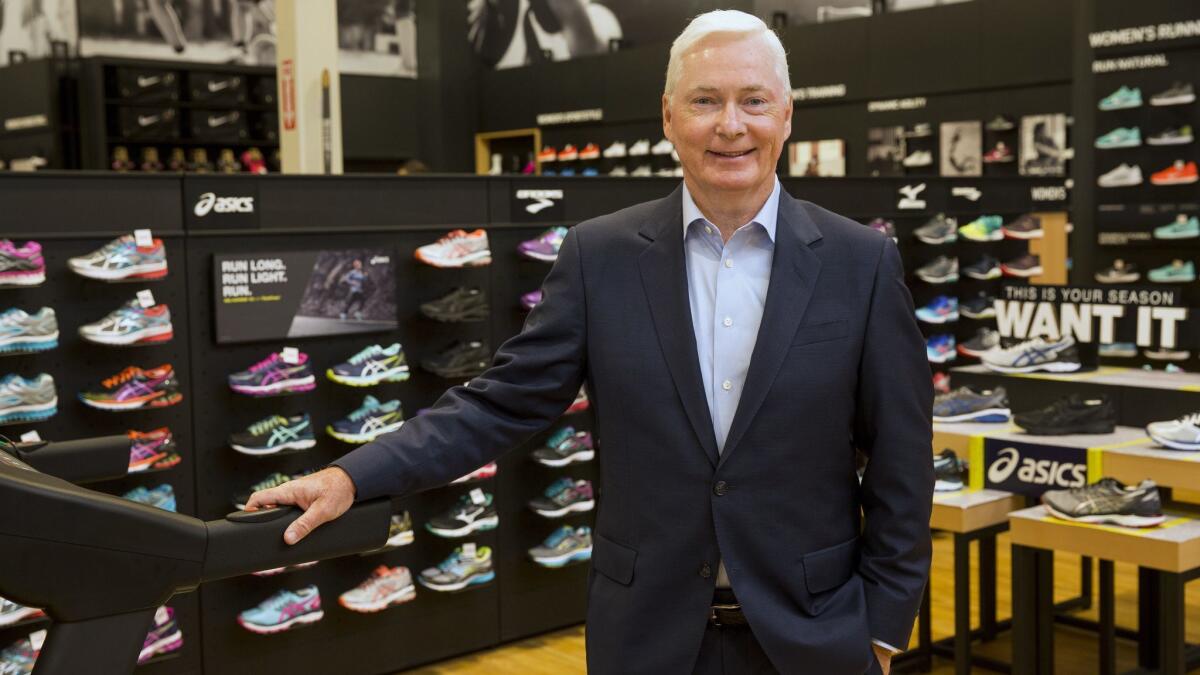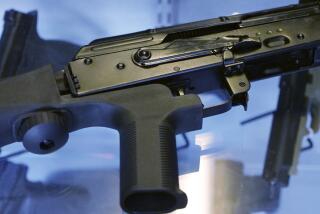In a rare move, corporate America presses for gun-control restrictions ‘to take a stand’
President Trump is expected to address the NRA at its annual meeting Friday in Dallas for the second time as president, but this year will be different.
The October shooting at a Las Vegas country music festival and the Parkland, Fla., high school shooting in February are not only expected to generate some of the biggest protests ever at the meeting — but they have so changed the political calculus that even Wall Street is taking action.
A group of retailers, major banks, money managers and others are spearheading a campaign for tighter gun-control restrictions in the absence of movement by Congress.
“This is an issue that’s not going away,” said Dick’s Sporting Goods Chief Executive Edward Stack, among the most outspoken private-sector advocates for changes in gun laws. “We needed to take a stand.”
Dick’s, one of the nation’s largest sporting good chains, banned gun sales to customers under 21 at its 800 Dick’s stores and 35 Field & Stream outlets — and stopped selling assault-style weapons at the Field & Stream stores — following the Feb. 14 shooting at Marjory Stoneman Douglas High School that killed 17 people.
The tragedy followed by just four months the Oct. 1 shooting in Nevada that killed 58 and injured hundreds more.
Two other huge retailers, Walmart Inc. and Kroger Co., followed Dick’s move in curbing gun sales, including banning sales to customers under 21.
While it’s commonplace for businesses, pension funds and activist shareholders to take up social causes, such as the environment and diversity, the widening effort by companies and Wall Street to restrict firearms sales — and to urge Congress to take legislative steps — is a rare instance of the private sector helping steer a social movement and not waiting for Washington to act.
The effort by Dick’s and other private firms is not unlike earlier, concerted investor campaigns against tobacco companies and apartheid in South Africa, in which “people were taking those stocks out of their portfolios and putting pressure on companies,” said Nell Minow, vice chairwoman of ValueEdge Advisors, which promotes strong corporate governance.
“Investors were on it before the states’ attorneys general and the regulators were on it,” she said. In the gun-control movement, too, the private sector “is a leading indicator that the mood of the country is changing,” Minow said.
More than a dozen companies also ended their discount programs with the National Rifle Assn. immediately after the Florida high school shooting to distance themselves from the gun lobby. The NRA called the response “a shameful display of political and civic cowardice.”
These are the companies that have cut ties with the NRA »
“We’re surprised that so many have” followed Dick’s lead “and the stances they’ve taken, and we’re very happy that they did,” said Stack, himself a gun owner, in an interview.
The company already had ended sales of assault-style weapons at Dick’s stores after the 2012 mass shooting at Sandy Hook Elementary School in Connecticut, in which 26 people, including 20 first-graders, were killed.
Another leading Wall Street company, banking giant Citigroup Inc., said it would place restrictions on firearms sales for its new retail business clients, including that they don’t sell guns to someone who hasn’t passed a background check and is under 21.
As for the bank’s existing business customers, Citigroup hopes “they will adopt these best practices over the coming months” but if they don’t, the bank will “work with them to transition their business away from Citi,” Chief Executive Michael Corbat said in a memo to his employees.
Corbat, like Stack, noted his own gun ownership, adding that he is “an avid outdoorsman and responsible gun owner.”
Bank of America Corp., meanwhile, stopped lending to manufacturers of military-style weapons that are available to consumers.
“We want to contribute in any way we can to reduce these mass shootings,” Anne Finucane, a Bank of America vice chairman who leads the bank’s environmental, social and governance efforts, recently said on Bloomberg Television. “It is not our intent to underwrite or finance military-style firearms on a go-forward basis.”
A dozen U.S. senators, including Sen. Dianne Feinstein (D-Calif.), this week called on other major banks to follow suit, saying “there is a growing consensus in the private sector that companies can and should take action to address the problem of gun violence in our country.”
Dick’s also is destroying the assault-style weapons it has banned from its Field & Stream stores. That is not because the chain was concerned the guns might eventually be traced back to Dick’s, but because “our preference would be that these guns are not in the marketplace,” Stack said.
“If we sold these guns to someone else, then they would be in the marketplace and we felt that would be hypocritical,” he said.
The chain also has retained a Washington, D.C., lobbying firm to work with Congress and push for legislation, Bloomberg reported.
Indeed, the politics have changed so much on the issue that even Trump — who last year thanked the NRA at its convention for supporting his presidential campaign — has recently publicly stated that legislators should not be afraid to defy the group in reaching a comprehensive gun-control package.

But the private-sector actions also are emblematic of the hotly debated and divisive gun-control issue itself: Even though the companies generally seek the same result, their campaigns in some cases have caused crosscurrents for the firms.
For instance, BlackRock Inc., the nation’s largest money manager with $6.3 trillion of assets under management, is one of the largest investors in gun-related companies. It plans to remove the stocks of Dick’s, Walmart and other retailers from some of its existing and planned investment funds because, despite the retailers’ gun-control efforts, the retailers still sell firearms.
“We believe that this [Parkland] event requires response and action,” BlackRock said last month.
BlackRock is led by Chief Executive Larry Fink, a longtime advocate of social responsibility by corporate America and Wall Street. In his annual letter to CEOs this year, Fink wrote that every company “must not only deliver financial performance, but also show how it makes a positive contribution to society.”
BlackRock will still hold positions in gun makers or sellers that are part of exchange-traded funds that replicate stock indexes if customers want those ETFs, but BlackRock’s funds that exclude firearms-related firms give investors an option. “It is ultimately our clients’ choice about the types of funds they invest in,” the money manager said.
Asked whether BlackRock’s move to strip Dick’s and other retailers from certain funds penalized his company despite Dick’s own gun-control efforts, Stack said “every company, whether it’s a retailer, a services company or a financial-based company — they’ve got to do what they feel is right for their management and their investors.”
“Clearly BlackRock must have felt that was in their best interest,” Stack said. “I’m not going to comment more than that.”
But then BlackRock found itself criticized by David Hogg, a Parkland student who became a leading public figure in the groundswell of student gun-control activism after the shooting.
In a recent Twitter post, Hogg urged a boycott of BlackRock and Vanguard Group, another major money manager, because they are “two of the biggest investors in gun manufacturers.”
Regardless, companies and Wall Street “are going to keep leading the charge to change policy” in the gun-control effort because “I see it spreading” among private firms nationwide, said Gonzalo Freixes, an adjunct professor of accounting at UCLA’s Anderson School of Management who’s been tracking the issue.
“They will take a stand and try to effectuate government policy,” Friexes said of the companies.
Indeed, Stack said legislative change is unlikely soon, so the private sector will have to keep pressing the issue.
“We spent a lot of time in Washington over the last several weeks, and we’ve talked to a number of people in Congress,” Stack said. “It doesn’t seem, at least in this Congress, that there’s going to be a solution.”
In the meantime, the private-sector push is “a groundswell in the country today that is not going to stop,” Stack said. “The private sector should lead. But Congress should act.”
Twitter: @PeltzLATimes
UPDATES:
3:30 p.m. May 3: This article was updated with information about President Trump’s speech before the NRA, Dick’s decision to hire a lobbyist and a call by U.S. senators for more financial institutions to take steps to help tighten gun ownership rules.
This article was originally published at 3 a.m. on April 27.







